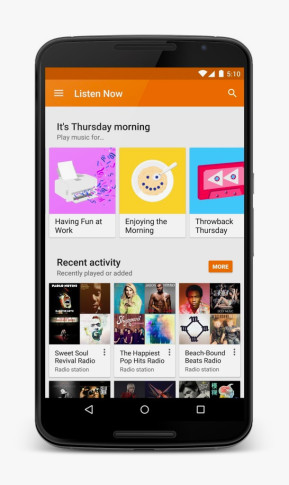When Google tells you hey, heads up, we’re launching an ad-supported version of Google Music tomorrow, you immediately come to a single question: What would Taylor think?
Barely 36 hours after Swift’s Tumblr letter went viral, prompting Apple to do an about-face and promise to pay artists during the three-month free trial of Apple Music, Google is offering a free tier to Google Music that it hopes will bring more users into the service. Elias Roman, a product manager on the service, says Google kept seeing people turned off by having to put in a credit card. “When you open up the free tier,†he says, “we have one agenda, and that is get you as quickly to music as possible.â€
Roman’s big plan is to have you open the app, press play, and just listen. The way he sees it, Google Music isn’t just a library or a search engine; its job is to provide music to make the things we do every day, better. Waking up, working out, commuting: everything can be better with the right tunes. Music will now use contextual information—day of the week, time of day, and device, for starters—to figure out what you’re doing and what you might want to listen to. Then, you’ll get a playlist full of songs perfectly tuned not just for you, but for right now. When it’s 2PM and you’re at your laptop, open up Music and you should see something like the “Music with a beat to work to†playlist. Once you’re home and the lights are off, the sexy-time playlist might start playing instead.
This kind of contextual knowledge is working its way across Google, from Google Now to YouTube and beyond. For the Music team, it’s designed to help people who don’t know what to listen to, or who keep listening to the same 12 songs every day because discovering good new music is too much effort. “They have no idea how to DJ for themselves,†Roman says, so Google is doing that for them. It’s trying to solve what Roman calls “Stale iPod Syndrome.â€
Google’s not copying Spotify, giving you unfettered access to every song on demand for the low, low price of free. Its on-demand approach is more like Pandora: You pick a song, artist, or album, and Google Music plays things based on your search. Your “If You’re Reading This, It’s Too Late†search might get you different Drake tracks, or songs from similar artists. Like Pandora—and regular ol’ FM radio—Google pays every time you play a song, at industry standard rates. “What we don’t think we should be offering for free is to have the key to Tower Records,†Roman says.
“I think what artists like Taylor Swift are concerned about is giving an interactive experience for free, just supported by ads,†he continues. “That’s the experience that’s most similar to, and cannibalizing, ownership and therefore sales, and that’s the experience that artists are concerned about offering in a free, ad-supported environment.†He compares Google Music to the radio, and comes back to the many ways Google Music upsells free listeners, trying to get them to drop 10 bucks a month. You get an ad-free experience, for one thing—though Google Music’s ads, which Roman says are just pre-roll videos when you first start a playlist, don’t actually sound that awful. You also get offline support, and on-demand access to the entire library—intelligently picking places to remind users of those benefits is key to Google Music’s plans.
This is the perfect microcosm of Apple’s and Google’s value differences. In Apple’s world, there’s a single radio station the whole world will listen to; in Google’s, everyone wants different things, and with perfect data it can deliver it to you automatically. In both cases, though, they want everyone listening to music, and they’re going to pay artists for it.
That sounds like something Taylor Swift, arbiter of the music industry, would be okay with.
Go Back to Top. Skip To: Start of Article.
Article source: http://www.wired.com/2015/06/google-music-free/

